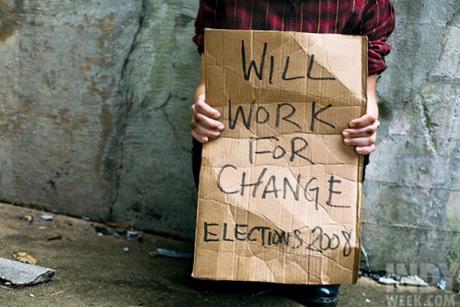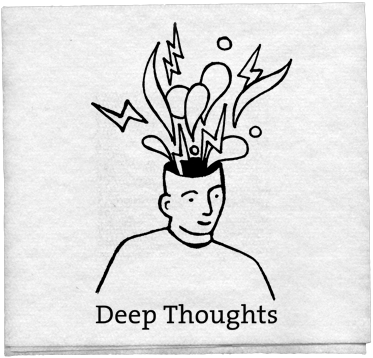An article by Scott Nappalos about meaning in choosing employment, from Libcom.org.
From the time I was a child, I was told to follow my dreams and do something I truly loved. Granted I rarely met an adult who was passionate about their work, but they seemed sincere in their desire for others to take that path. The advice of course usually had a piece of bitterness attached to it. As I came of age, the terrain didn’t look pretty. Most of my personal passions were deserts for employment. Nor did I really know anyone who was living the dream, so to speak, at work. My path began from leaving that advice behind.
Society is littered with talk of meaningful work. The creative class, jobs that means something, doing something with one’s life, work that matters, helping people; we’re inundated with phrases, words, and images that describe our poverty and the future that we are supposed to aspire to.
It’s actually worse for people who commit themselves to making radical change in society. A confluence of pressures pushes down on them year after year through family wondering when they will grow up, friends perpetually moving on to something better, and a gnawing sense of wasted potential. Why bother with the endless meetings, the mindless work, and for what?
Unless you’re born into a situation where work is unnecessary, nearly everyone experiences the modern workplace. Service work in particular serves as a stark reminder of reality and alternatives. The unending drudgery of task after task slinging fatty coffee that literally poisons people’s health, selling useless items created on the backs of abused workers elsewhere, cardboard boxes rolling down the line that just keep coming and coming, forcing a smile when we are cursed at or harassed; Nearly everyone has been forced to participate in the bitterness of having our time stolen. It’s perhaps harder to bare for those who know the widest extent of the misery of humanity and understand how preventable it all is.
The sense of meaninglessness in jobs is a strong current in society. Tv shows, films, music, and other forms of pop culture repeat the comedy, frustration, and depression of spending one’s time on tasks that seem pointless. This isn’t to say that people’s jobs don’t make a difference. Many things we do keep society running and contributes to the social good. The meaninglessness of work in today’s society arises out of the reflection of workers that their time is not really benefiting the people they serve or advancing them as people. As a healthcare worker I can see both sides of this. Obviously healthcare is crucial for societies. At the same time any hospital worker can recognize how it is that the healthcare system not only harms people, but also in general contributes to people staying sick. Meaning is something deeper than just keeping the gears moving and helping our fellow human beings. Meaning is about where we are headed and who we are. This is where youth get squeezed and falter.
Modern capitalism with its base of debt makes everything seem possible. The compulsion to put food on the table is softened by easy credit. We can go back to school, live on credit cards, travel to cheap places, and find means to delay work enough to get by. Young people accumulate useless degrees and insane debts while deferring the future and often slipping into the delusions of jobs that simply do not exist. Choosing what to do with our lives takes on the characteristic of other more banal decisions. We are shopping for an ethical product. Validation stands at the core of this, and plays off the fear of a wasted life, idle efforts, and ending up trapped chasing false ideals. What to tell worried parents who watched their child squander what chances they had for material success? It is better to say that one is employed fighting poverty, educating the youth, or some other remix of Mother Theresa, Gandhi, or perhaps Bono.
The problem is that there is no escape. Professors spend decades moving town to town as itinerant adjuncts teaching the most bland classes, writing mechanical essays in desperation to stay published, and constantly struggling for something more stable. Even at it’s best, University life leaves less time for liberatory thought and action than the part time service worker. Union organizers spend seventy or eighty hour weeks at the service of hostile bureaucracies, and too often find themselves in the position of pimping the Democratic party and selling backroom deals with management to disillusioned workers. NGO staff share the same fate, bending to the will of the funders and forced to represent the interests of the powerful under false flags of social change. Self-employment and cooperatives turn activist efforts into business efforts, and consume more time than any capitalist could ever demand from a job. Good people find themselves lost there, tired of all the worn appearances that hide a rotten structure, yearning to escape too their work and get back to something more authentic.
We need to question and even condemn the pressure on youth to find meaningful work. As long as we live in capitalism, its deep wells will poison all the streams flowing into our cities. With capitalist work, even the most holy pursuit will end up in mindlessness, subservience to stupid management, and in fighting the current trying to make some good out of a hostile situation that constantly tries to undo our efforts. This isn’t to say that some don’t enjoy their jobs. Some do. Yet on the balance, the vast majority can’t find employment that will engage them, and those who do generally must sacrifice the rest of their lives for the privilege. The real question to be raised isn’t whether you should enjoy your job or not, but whether you should dedicate your life to work. Or better, what is the relation of living to working?
This logic should be turned on its head. It’s not what we’re employed doing that should define, validate, or give meaning to our lives; it’s our life itself that does. How much brighter does the future look to liberate oneself from the oppressive concept of boundless sacrifice to meaningful jobs? Why shouldn’t youth seek to maximize their lives against this work? There are other roads open to us. We can work, as we must, but can struggle to find the most time for ourselves and our causes. Better we write, protest, organize, and gather in our workplaces on time off, than to cement that relationship into employment or worse into our identities.
Our lives are defined by what we do, not who writes our paychecks. A political life is an attempt to regain a meaningful life. It is a task for all of society, and not monopolized by a special class employed as professional politicians, bureaucrats, and humanitarians. Meaning is not at work, but in the beauty of daily living, in struggling for a better world, and whatever path your desires take you towards. Our joy is not found in simply imposing our will onto the world, but in the happiness that can only be found in fighting for a more just and beautiful world around us. Dedicating oneself to the struggles of others changes you. Within, we must fight to constantly overcome ourselves against the current, a process that can be deeply enriching. The commitment and work of liberation makes all of society our classroom, our workplaces gymnasiums, and our neighborhoods galleries.
Sacco and Vanzetti remind us of the infinite potential and beauty of life even from within the walls of prison. The two Italian anarchist immigrants dedicated their lives to the causes of their class working as a cobbler and a fish peddler respectively. Their sacrifices were more than just in their professions, as they were framed for murder and executed by the state of Massachusetts. The writings of the pair from prison are inspiring not only for their perseverance and insights, but for their joy. Sacco wrote to his son Dante his final letter before his execution, sitting down as we do, to find words for the path life carries us down. Facing his own death and the life of his son in front of him, he wrote
“Don’t cry Dante, because many tears have been wasted, as your mother’s have been wasted for seven years, and never did any good. So, Son, instead of crying, be strong, so as to be able to comfort your mother, and when you want to distract your mother from the discouraging soulness, I will tell you what I used to do. To take her for a long walk in the quiet country, gathering wild flowers her and there, resting under the shade of trees, between the harmony of the vivid stream and the gentle tranquility of the mothernature, and I am sure that she will enjoy this very much, as you surely would be happy for it. But remember always, Dante, in the play of happiness, don’t you use all for yourself only, but down yourself just one step, at your side and help the weak ones that cry for help, help the prosecuted and the victim, because that are your better friends; they are the comrades that fight and fall as your father and Bartolo fought and fell yesterday for the conquest of the joy of freedom for all and the poor workers. In this struggle of life you will find more love and you will be loved.”[1]
In spite of all the sadness that surrounds us and plagues this world. Our daily lives can be the work of love. We do not need titles, positions, or to be taken into service to achieve this work. We only need the commitment to set ourselves to the betterment of all and to dive head in to the struggle against power. Against the monotony and pervasive depression we see, Vanzetti offers this:
“I am convinced that human history has not yet begun; that we find ourselves in the last period of the prehistoric. I see with the eyes of my soul how the sky is suffused with the rays of the new millennium.”[2]
Beyond the horizon of today lie potentials for humanity freed from the artificial constraints of society twisted by the contours of power and wealth. We do not need to imagine paradises, utopias, or that any political movement can solve all of humanity’s problems to see how much more is possible. This is the task of youth today, to constantly push further in practice and expose the expanding vista of human potential.
[1] Sacco, Nicola. 8/18/1927. Letter to Dante Sacco. http://law2.umkc.edu/faculty/projects/ftrials/SaccoV/sacltrchar.html
[2] Bartolomeo Vanzetti. The Story of a Proletarian Life. http://theanarchistlibrary.org/library/bartolomeo-vanzetti-the-story-of-a-proletarian-life






